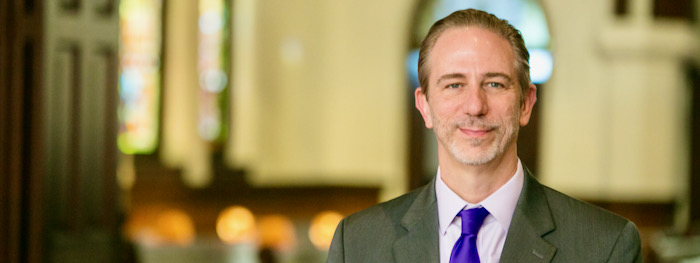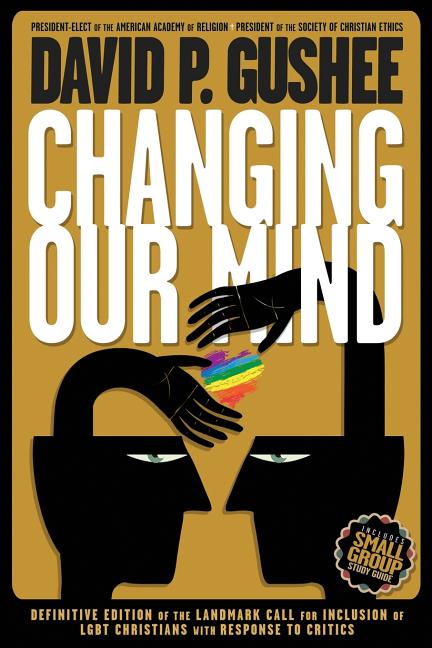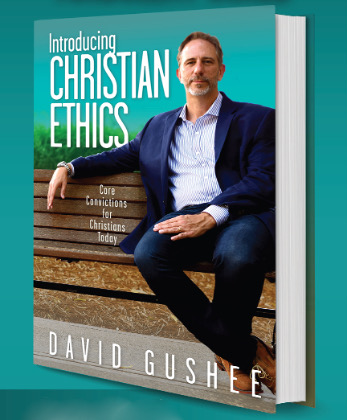The success of Dr. David Gushee’s ‘Changing Our Mind’ is measured in 25,000 lives inspired

I learned this week that sales of my 2014 book Changing Our Mind (COM) are just about to cross 25,000, apparently very rare in the book business.
That’s why, this week, I have decided to write this column for Front Edge Publishing and Baptist News Global. Longtime-readers of my columns for BNG will remember that COM began as a series of posts beginning in the summer of 2014. People often ask me what led me—a straight, married, Christian—to write when I did and how I did about LGBTQ inclusion.
The simple answer is that I felt …
Compelled, Responsible and Free
Compelled: the “LGBTQ issue” kept coming at me, in my family, school, church, the lecture circuit, and public life, and I felt summoned finally to address it in a serious way.

Responsible: As a seasoned Christian ethicist who identified as evangelical, seeing the hash that evangelicals were making of LGBTQ inclusion, and knowing that I had not seriously addressed the issue, I believed finally that I had a responsibility to make use of my platform to attempt the effort.
Free: I was confident that my employer’s understanding of academic freedom was ironclad, and that my church would be supportive. Thankfully, Mercer University and First Baptist Church Decatur came through for me as expected, and so I had the (rare) freedom to address LGBTQ inclusion without fear. I knew that very, very few scholars or pastors who identified as evangelical had that kind of freedom. It contributed to my sense of compulsion and responsibility.
It was my Kairos moment. It was time.
It was also somewhat foolhardy. I had a Tuesday deadline each week. I just started writing, in public, week by week, addressing the inclusion issue from the ground up, doing the best that I could within deadline constraints and while teaching full time.
I was also dealing with the decline and eventually the death of my beloved mother. Ironically, this seems to have made me more fearless, as this pretty-traditional Catholic mother had taken the path toward inclusion with my own sister. After a while, the series began to feel like a tribute to her. I do not recommend writing a closely watched, highly controversial series of articles on a week-by-week deadline while a beloved family member is dying. But that is what happened.
Without any foreordained plan on my part, the series began taking on the feeling of a book. This was noticed by David Crumm, Michigan-based journalist, editor, and publisher, a fellow dissident evangelical, who proposed to turn the articles into an almost-instant book when I was through. Thus, nineteen articles became Changing Our Mind in October 2014. The book was launched at the Reformation Project meeting in Washington on November 8, 2014. There I gave a speech called “Ending the Teaching of Contempt,” which besides being an unforgettably moving experience rather quickly became the twentieth and final chapter of the book.
What’s in the book?
Changing Our Mind essentially has three parts. The first eight chapters are context-setting and basic, describing the situation of Christian rejection of our own LGBTQ minority against the backdrop of broader clinical and social acceptance, the grave tensions in the churches, the history of Christian demagoguery and discrimination, and the need to set at least a baseline minimum of decent behavior toward LGBTQ people.
The next eight chapters deal with the “Big Six” passages usually cited for anti-LGBTQ theology, from Sodom to Genesis 1-2. I concluded (and still believe) that the primary biblical issue that goes beyond parsing a few scattered Hebrew and Greek words is creation theology. That is, whether Christians can integrate the diverse and complex reality of human beings as they actually exist in the world with a primal creation narrative/theology/ethic in which humans come in exactly two types (male and female) and with exactly one sexual orientation (heterosexual). Especially if one holds on to a marital-covenantal sexual ethic, as I do, pretty much the entire “LGBTQ issue” comes down to a classic faith/science, scripture/reality, text/human being, problem.
The third part of the book zooms out to meta-reflection on issues such as whether transformative encounters with real human beings should affect Christian thinking, how growing social acceptance of LGBTQ people should be interpreted by Christians, and what historical comparisons are most appropriate and relevant. I argue that God wants to teach us through human encounter, that social acceptance of LGBTQ people does not mean social decadence, and that the best historical analogies are with previous times when groups of Christians did not treat all human beings as equal in worth and dignity. In other words, this is not about combating moral and cultural decline, but overcoming Christian failure to truly love all our neighbors as ourselves.
The costs and the ultimate value
Eight years later, I still feel the scars of what the book cost me. I was harassed, rejected, and cancelled in many circles I had once valued. But by now I mainly think about the hundreds of letters I have received from all over the world that have said things like these (used with permission):
“I’m a [late middle age] man. I remember the countless trips to the altar I made as a teenager, the troubling nightmares I had of going to hell, the desperate fear I had of being found out, and total confusion I had when, as a Christian, I chose to come out only to find that there was no one there.”
“I’m a pretty damaged guy who still struggles with bitterness towards my church and I haven’t really decided if I want to ever fully embrace Christianity again…You brought me to tears when you asked forgiveness for taking so long to realize how the church should treat LGBTQ people. It made me envision what it would sound like and feel like if I ever heard that from my parents or church. It made it seem possible, even if only remotely. I pray that I hear it one day, sooner than later.”
“I am the Christian mother of a gay son. God has taken us on such a journey. I just can’t tell you how my life has been changed for the better with my acceptance of our son. I felt like for far too long I needed permission to love my own child. Our son has been so hurt that I’m not sure where he stands with Christ currently. Breaks my heart that people felt they had the right to say who can and can’t be loved by God.”
“Just seeing the amount of gay people (including my daughter) who really do want to seek and honor God but are stopped from doing so by well-meaning Christians…It breaks my heart to see how many have been afraid to enter a church. I am committed to stay in our church to respectfully work on this and my pastors seem to be willing to as well, but I’m sure they are very afraid, too.”
“I am a psychologist and I have many times found myself sitting across from a homosexual client who has been ostracized by their religious community and family. I hope that your thoughts will contribute to a more sensitive understanding of the LGBTQ community.”
Professors do a lot of stuff that is soon forgotten: lectures, assignments, committee meetings, papers, grading.
Writers do a lot of writing that few people read and that is also soon forgotten.
Quite beyond any intentionality on my part, I was given the opportunity to write a book that, according to some of its readers, has reconciled parents to their own children, pastors to some of their most vulnerable congregants, and LGBTQ people to themselves, to life, and to Jesus.
For this, I am truly grateful.
Care to learn more?

To see how Changing Our Mind fits into Dr. Gushee’s larger career as a Christian ethicist, order a copy of his latest book: Introducing Christian Ethics.
From the book’s description on Amazon:
What does it mean to be a Christian in today’s turbulent world? After every disillusionment and debate, what convictions survive? Dr. David P. Gushee is an influential voice in American religious life as an ethicist, pastor, and activist. He’s advocated on issues ranging from torture and climate change to truth in politics and LGBTQ inclusion. He co-authored the pivotal Kingdom Ethics, a Jesus-based ethics textbook, and has written numerous books and hundreds of opinion pieces on what Christianity has to say about how we should live. Now, in this ambitious new book, Gushee sums up his many years of teaching and experience to provide a definitive, comprehensive vision of the Christian moral life.
With twenty-five easy-to-digest chapters, plus audio and video versions that readers can access from links in each chapter, Introducing Christian Ethics offers readers a way to understand how to situate moral reasoning not only in scripture, but also in tradition and human reasoning. It offers a focus on Jesus and the disinherited, and a nuanced rethinking of the kingdom of God and its meaning for Christian ethics. Drawing on Gushee’s own work and life story but also a richly diverse set of sources, it covers general principles like virtues, truthfulness, love, and justice. And it discusses issues like creation, patriarchy, white supremacy, abortion, sexuality, marriage, politics, crime, and more.